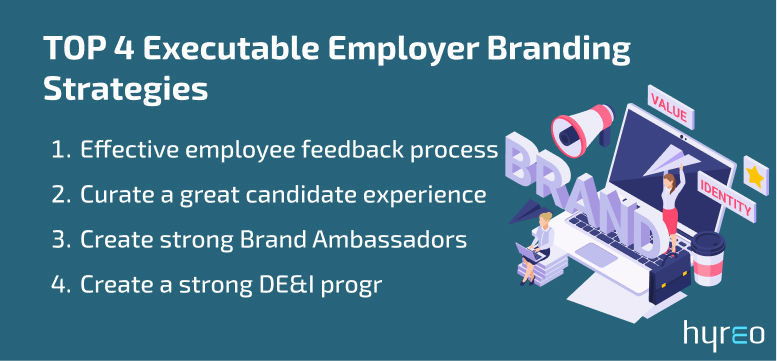An Employer Brand is a powerful tool for attracting and hiring top-quality talent and the most important aspect of a company’s business strategy, propelling it forward to success.
Per LinkedIn, 80% of talent acquisition leaders believe that Employer Branding has a significant impact on their ability to hire great talent. Additionally, companies with a strong Employer Brand attract 50% more qualified candidates.
A compelling Brand story is often the best way to reach out to and attract talent at the time of a business need for growth. However, to be an Employer of choice, it is even more important to invest in building a strong Employer Brand, one of being a great place to work and providing exceptional value to its people.
In today’s highly competitive job market, it is important to create and execute a comprehensive Employer Brand Strategy, helping build & articulate the Employer Brand and Employee Value Proposition to all its stakeholders.
What is Employer Branding?
An Employer Brand is a combination of its market identity and its reputation amongst its employees, customers and other stakeholders. It is the market perception of the company as an employer and also the rewards and benefits provided to their employees for their valuable contributions, better known as Employee Value Proposition (EVP).
According to Randstad’s report analysis on LinkedIn, 82% of employees would leave their current organization if they were to get offers from an organization with a better Employer Brand.
Employer Branding can be defined as the approach to enhancing the Employer Brand through a comprehensive list of activities and campaigns. It is a powerful advertising and promotion tool, enabling companies to position themselves as a great place to work, attracting highly qualified candidates.
Why does a company need an Employer Brand Strategy?
A positive Employer Brand not only helps to attract potential employees, it also serves to be a great retention tool, directly impacting the company’s bottom line in terms of saved recruitment costs and business value from existing employees.
Conversely, negative reviews on career sites and social media from former and current employees can greatly hamper the company’s ability to hire & retain top talent or achieve their business goals and targets.
A great Employer Brand, per LinkedIn, has the potential to:
- Attract 50% more qualified candidates
- Reduce the attrition or turnover rate in the organization by 28%
- Reduce cost-of-hire by 50%
- Cut Time-to-Hire by 50%
So why does a company really need to invest in creating a strong Employer Brand?

#1 Attract Top-Notch Talent
#2 Lower Attrition
#3 Accelerated business growth
#4 Lower recruitment costs
#5 Higher Customer Satisfaction & Retention
Check the detailed blog about benefits of employer branding.
8 Executable Employer Branding Strategies
Employer Branding is about how your employees feel about the company, evoking emotions of connection, value, belonging, and respect.

Therefore, it is important to create an Employer Branding Strategy with the employees and their views, opinions & recommendations integral to it, helping attract and retain top-quality talent.
#1 Employer Brand survey
#2 Define & articulate EVP
#3 Social Media Branding
#4 Align policies to values
#5 Effective employee feedback process
#6 Curate a great candidate experience
#7 Create strong Brand Ambassadors
#8 Create a strong DE&I program
Check out the detailed article about strategies for employer branding.
Wrapping Up
An employer’s brand, the culture of an organization and the treatment of its employees, and what it represents to its employees, both internal and prospective, in terms of work culture, values & leadership, has a direct impact on their ability to attract highly qualified potential candidates.
69% of candidates wouldn’t accept a job with a company that has a poor Employer Brand even if they don’t have a job.
Considering that 74% of potential candidates research company sites and seek reviews on career sites and social media for credible information on a company’s work culture and business practices, it is important to manage the Employer Branding actively with a strong and comprehensive Employer Brand Strategy.
FAQs on Employer Brand Strategy
How do you develop an employer branding strategy?
It is important to have a robust and dynamic employer branding strategy in order to attract highly qualified talent. The brief steps to develop an employer branding strategy are:
1. Employer Brand survey
2. Define & articulate EVP
3. Social media branding
4. Align policies to organizational values
5. Implement effective feedback and improvising process
6. Create a great candidate experience
7. Use employees as strong brand ambassadors
8. Create a strong DE&I program
What does an employer brand consist of?
An Employer Brand is a combination of its market identity and its reputation amongst its employees, customers and other stakeholders. It is the market perception of the company as an employer and also the rewards and benefits provided to their employees for their valuable contributions, better known as Employee Value Proposition (EVP).
What are four ways to enhance an employer brand?
In order to enhance the Employer Brand strategically, it is important to adopt the following:
1. Adopt the right recruitment tools
2. Review and make changes based on the Social Brand reviews
3. Market the company’s work culture
4. Ensure career growth and training for employees
Why is employer branding strategy important?
A strong employer branding strategy enables a company to grow their business in the long run by helping them attract and retain top-quality talent. A strong employer brand also helps current employees feel valued and respected, making them proud to be a part of the company.
What is the key to having a strong employer brand?
In order to build a strong employer brand, leverage the below 4 step process:
1. Create a clear employee value proposition
2. Listen to employee feedback actively
3. Build a strong social media presence
4. Consistently track and evaluate online reviews




